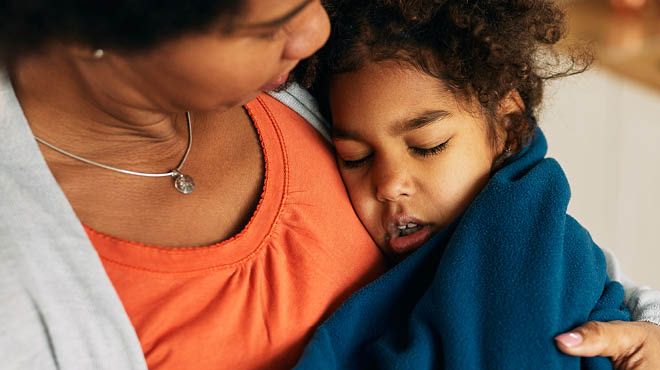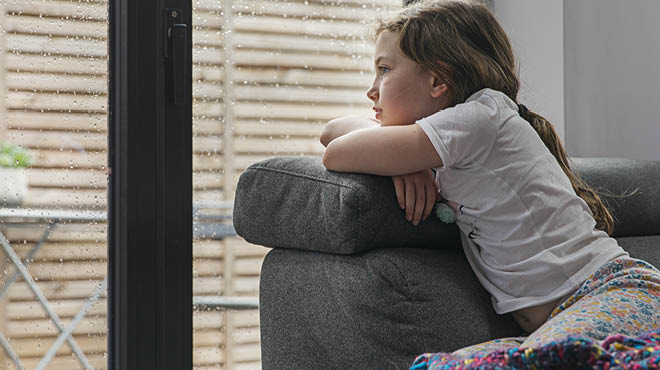Recent Posts
What you should know about RSV and the RSV vaccine

Respiratory syncytial virus, or RSV, is a common virus that most people will get by age 2. It causes mild cold symptoms for most people, who usually recover in a week or so.
RSV can be serious for infants and older adults, however. When severe, it can lead to bronchiolitis or pneumonia. Bronchiolitis, or inflammation of the airway, is one of the most common causes of children needing hospitalization in the winter months.
RSV outbreaks tend to occur from October to May each year. People with RSV do not develop natural immunity to it, so it's possible to get the virus multiple times a season.
What are the symptoms of RSV?
Symptoms of RSV can be similar to other viruses, like a cold or the flu, and may include:
- Dry cough
- Low-grade fever
- Mild headache
- Runny nose or congestion
- Sore throat
- Wheezing or difficulty breathing
A child with RSV may not want to eat or drink as often as usual and may be more lethargic or sleepy.
In many places, testing for the flu also testing for RSV. This is because flu and RSV seasons typically overlap, and the viruses have similar symptoms.
Who should consider getting the RSV vaccine?
The Food and Drug Administration (FDA) has approved a seasonal vaccine to protect infants, pregnant people and older adults from RSV.
RSV vaccines for pregnant people
To prevent severe RSV disease in infants, pregnant people can receive the vaccine during 32 to 36 weeks gestation. The baby receives protection from RSV complications for up to three months after birth.
The vaccine is typically administered from September through January.
People who received an active vaccine during a previous pregnancy are not recommended to receive it again. In this case, parents or caregivers should work with their healthcare team to determine if the baby should receive the passive immunization, typically administered in late October through the end of March.
RSV immunizations for infants
Immunization is recommended for infants under 8 months old who are not protected by a maternal RSV vaccination between 32 and 36 weeks of gestation during the current pregnancy and at least two weeks before birth. The baby typically receives the immunization from late October through the end of March. The immunization provides four months of protection to the baby.
Older infants at high risk for RSV also are eligible to receive the vaccine.
RSV vaccines for older adults
Active vaccines are approved for adults. Vaccines from multiple manufacturers are available for adults 75 and older or those 60 to 74 at risk for severe RSV disease.
Older adults can be vaccinated at any time of the year. Healthcare professionals recommend vaccination during late summer or fall before RSV spreads in the community.
An adult should receive any of the RSV active vaccines once. After that, booster vaccines are not currently recommended.
Talk with your healthcare team regarding questions about when and where you or your infant may be able to receive the RSV vaccine.
Can the risk of illness from RSV be reduced?
Taking these specific steps also can lower the risk of RSV in children, pregnant people and adults:
- Don't skip a flu shot. An annual flu shot is recommended for everyone older than 6 months. Talk to your child's healthcare team about the number of doses needed based on your child's age and prior vaccination history. Children younger than 9 may need two doses of the vaccine if they are receiving it for the first time or have only received one dose in total previously.
- During pregnancy, it's recommended for women to receive one dose of Tdap vaccine, regardless of when the last Tdap or tetanus-diphtheria (Td) vaccination was given. Ideally, the vaccine should be given between 27 and 36 weeks of pregnancy.
- Get vaccinated for COVID-19. The COVID-19 vaccine is available for children 6 months and older.
- Stay away from tobacco products and second-hand smoke.
- Stay home if you are ill and avoid contact with people. Keep children home from day care or school if they don't feel well.
- Wash your hands frequently with soap and water. Hand-washing helps prevent the virus from spreading from the hand to the mouth, nose or eyes. Think about times during the day to wash the hands of everyone in the family, such as before making a meal, serving prepared food and after using the restroom.
- Wipe down high-touch surfaces, such as countertops, doorknobs and children's toys regularly.
Can RSV in children be treated at home?
For most children who develop RSV, home remedies can ease symptoms. RSV symptoms usually last from two to eight days, but some children might have a cough for a few weeks before fully recovering.
At-home remedies include:
- Drinking plenty of fluids
- Using a cool-mist humidifier
- Trying saline nasal drops
Over-the-counter pain medication, such as acetaminophen, can be helpful. But check with your child's healthcare team about correct dosing before using over-the-counter pain medications.
Seek immediate care for a child with RSV if they develop these symptoms:
- Breathing that is fast, shallow or noisy
- Extreme irritability
- High fever
- Significant decrease in eating or drinking
Babies and young children can become very sick quickly due to RSV.
Primary Care On Demand virtual care service
As seasonal cases of upper respiratory infections continue to rise, patients living or traveling in Iowa, Minnesota or Wisconsin can use Primary Care On Demand for quick symptom assessment and video visits with a physician. This new app-based virtual care service offers convenient care for new and worsening symptoms associated with influenza, strep throat, respiratory syncytial virus and COVID-19. Primary Care On Demand is available 24/7/365 for patients ages 3 and older.
Dennis Costakos, M.D., is a neonatologist in La Crosse, Wisconsin.






